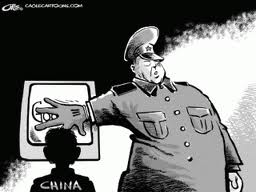China Internet Network Information Center (CNNIC) imposed the 14th of December a total control of domain names, to have the complete power over the internet. The CNNIC has recently introduced a procedure for those who want to register a domain: the registration must be done in a written application form and they can only register if they prove they own a business and can provide the registration information (paper documents, a copy of the business license and copy of the national ID card of the individual who wants the web page). Furthermore, China’s government wants to force people to have a license for providing audio or video content, the result has been that anyone who wants to provide audio-content needs to have legal personality and the web has to be financed by the state.
Chinese citizens are able to use the Internet to communicate with others, for entertainment, to take part in commercial activities and to obtain allowed information. When China started to use the Internet, it presented a challenge to the Chinese government control over information flows and public opinion, however, in search of economic growth and modernization, the government actively promoted Internet development.
Some people hoped that this would encourage political expression and democracy in the country. However, the Chinese government has the most sophisticated content-filtering Internet regime in the world (according to an empirical study of the OpenNet Iniciative). The governments of the People’s Republic in China (PCR) places strict limitations on its domestic and foreign news media. Information that is considered “politically sensitive” or that conveys organized dissent and criticism of the Communist Party is not tolerated. Information websites such as the BBC, Voice of America, Radio Free Asia and the public encyclopedia, Wikipedia, have been regularly blocked in China, while other news sources, such as the New York Times, the Washington Post, the South China Morning Post (Hong Kong) and CNN have been completely blocked. Websites that carry news in Chinese language generally face greater censorship obstacles than English-only webpages.
A recent example to China's Internet Governance is the "Sidi Bouzid Revolt" or the "Jasmine Revolution".The Chinese government is afraid that the echos of the Arab revolution will reach China and provoke an uprising of the sort. Consequently, the government has censored words like "Sidi Bouzid" and "Jasmine" in order to avoid revolutionist ideas reach the Chinese people.
Click here to get more information about the subject


A very enlightening blog Sarah. What's happening in China with the 'Jasmine Revolution' is extraordinary due to its character. Something similar happened in Egypt this year with all the rebellions going on, they disabled mobile phones and blocked the internet for a few days to avoid larger groups getting together, which eventually happened. In Russia, the art group 'War' has produced another strange and radical action called 'Kiss the cop, or train in kissing them dead'. The campaign consists in female group participants going up to female officers and kiss them, or try to. It's a response to the entry into force of the Law on Police on the 1st of March. Here is the link of the video posted by them: http://www.youtube.com/watch?v=59_tsl-Z48w
ReplyDeleteIt's incredible what is happening in these kind of countries, the control that a government can have on the population.
ReplyDeleteIn these times is even understandable seeing what is happening in Egypt or Libya, for fear of being the following...
Many authoritarian governments consider the move toward the new digital age is a threat to their power. Internet unavoidably brings freedom, and the net is an abstrac area in which control doesn´t have any sense.
ReplyDeleteHistorically, the chinese government has acted and made campaings in order to weed out the wersten influence. Years of ideological pressure sometimes help dictators to keep its power, but cyberactivism exits.
As Marta refers to, we have already seen how Internet is being able to remove tyranny...
Recently there has been serious protests against the syrian government. Abad, the president, has stated that these protests have been caused due to a "big conspiration" and has accused the social networks for triggering this chaos.
ReplyDelete